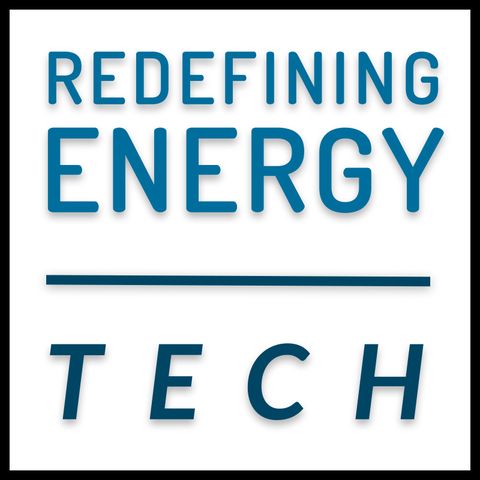15. Clearing the Air: Dr. Romm on Carbon Offsets vs Real Climate Solutions (1/2)

Download and listen anywhere
Download your favorite episodes and enjoy them, wherever you are! Sign up or log in now to access offline listening.
Nov 8, 2023 ·
42m 52s
Welcome to another episode of "Redefining Energy Tech," hosted by Michael Barnard. Today, we have the pleasure of having Dr. Joseph Romm, a Senior Research Fellow at the University of...
show more
Welcome to another episode of "Redefining Energy Tech," hosted by Michael Barnard. Today, we have the pleasure of having Dr. Joseph Romm, a Senior Research Fellow at the University of Pennsylvania Center for Science, Sustainability, and the Media. Dr. Romm, with a rich background in physics and public policy, has significantly contributed to our understanding of climate solutions, especially in areas like direct air capture and offsets.
Dr. Romm shared about his journey, recounting his time working closely with Amory Lovins at the Rocky Mountain Institute, and his role as the Deputy Assistant Secretary at the Department of Energy. Post his tenure at the Department, he dedicated himself to climate communication, contributing to the Climate Progress blog until its unfortunate closure. Following this, he took up his current position at the Center under the leadership of Michael Mann, where he is actively involved in research and is in the process of writing three papers focusing on bioenergy carbon capture and storage (BECCS), direct air capture (DAC), and carbon offsets as potential climate solutions.
The discussion started with the concept of carbon offsets, their limitations, and their role in the broader climate change mitigation strategy. Dr. Romm highlighted the concerning trend of organizations opting to pay for projects in places like Brazil or investing in tree planting and deforestation prevention as a means to offset their own emissions. He emphasized the distinction between voluntary market offsets and regulated offsets, pointing out the lack of oversight in the voluntary market which has led to a decrease in price and quality, and the more robust, yet expensive and complex nature of regulated offsets under agreements like the Paris Accord.
The conversation touched upon the 2015 Paris Agreement, its goals, and the challenges in achieving them, specifically addressing the complexities of trading and offsets. They discussed the developments since the agreement, including the introduction of authorized offsets in November 2021, and the concept of corresponding adjustments to prevent double counting of emission reductions. The example of Brazil was highlighted, demonstrating how countries could sell offset credits while maintaining their official emission levels through corresponding adjustments. However, this practice raises concerns about the future, especially for poorer countries that might find themselves at a disadvantage, potentially being pushed out of these markets.
The first half of the discussion concluded with the importance of genuine emission reductions, the challenges associated with offsets and corresponding adjustments, and the need for careful consideration to ensure that the mechanisms in place truly contribute to global emission reduction efforts without exploiting poorer nations.
Read Dr. Romm’s paper on offsets, bioenergy and carbon capture and direct air capture to prepare for COP28. They are available from the University of Pennsylvania.
LInk to Joe Romm publications: https://web.sas.upenn.edu/pcssm/publications/
show less
Dr. Romm shared about his journey, recounting his time working closely with Amory Lovins at the Rocky Mountain Institute, and his role as the Deputy Assistant Secretary at the Department of Energy. Post his tenure at the Department, he dedicated himself to climate communication, contributing to the Climate Progress blog until its unfortunate closure. Following this, he took up his current position at the Center under the leadership of Michael Mann, where he is actively involved in research and is in the process of writing three papers focusing on bioenergy carbon capture and storage (BECCS), direct air capture (DAC), and carbon offsets as potential climate solutions.
The discussion started with the concept of carbon offsets, their limitations, and their role in the broader climate change mitigation strategy. Dr. Romm highlighted the concerning trend of organizations opting to pay for projects in places like Brazil or investing in tree planting and deforestation prevention as a means to offset their own emissions. He emphasized the distinction between voluntary market offsets and regulated offsets, pointing out the lack of oversight in the voluntary market which has led to a decrease in price and quality, and the more robust, yet expensive and complex nature of regulated offsets under agreements like the Paris Accord.
The conversation touched upon the 2015 Paris Agreement, its goals, and the challenges in achieving them, specifically addressing the complexities of trading and offsets. They discussed the developments since the agreement, including the introduction of authorized offsets in November 2021, and the concept of corresponding adjustments to prevent double counting of emission reductions. The example of Brazil was highlighted, demonstrating how countries could sell offset credits while maintaining their official emission levels through corresponding adjustments. However, this practice raises concerns about the future, especially for poorer countries that might find themselves at a disadvantage, potentially being pushed out of these markets.
The first half of the discussion concluded with the importance of genuine emission reductions, the challenges associated with offsets and corresponding adjustments, and the need for careful consideration to ensure that the mechanisms in place truly contribute to global emission reduction efforts without exploiting poorer nations.
Read Dr. Romm’s paper on offsets, bioenergy and carbon capture and direct air capture to prepare for COP28. They are available from the University of Pennsylvania.
LInk to Joe Romm publications: https://web.sas.upenn.edu/pcssm/publications/
Information
| Author | Laurent Segalen + Gerard Reid |
| Website | www.redefining-energy.com |
| Tags |
Copyright 2024 - Spreaker Inc. an iHeartMedia Company
